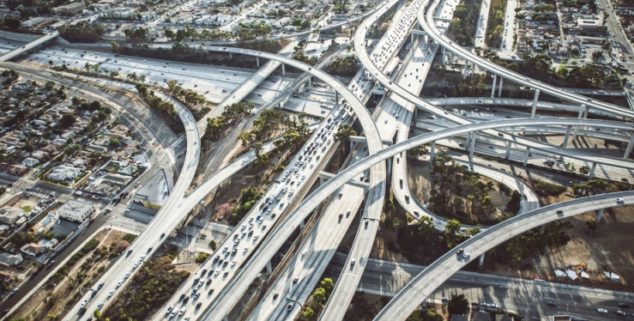Opinion
California must keep its critical investments in roads, bridges
 A Los Angeles freeway interchange. (Photo: oneinchpunch, via Shutterstock)
A Los Angeles freeway interchange. (Photo: oneinchpunch, via Shutterstock)For the past two years, traffic patterns as we once knew them shifted dramatically as people abided by public health guidance during the pandemic to work from home and congregate in fewer places.
For a short while, this did, in fact, result in fewer cars on the roads and granted California communities a limited reprieve from traffic congestion. During this time, the state and many counties and cities also were able to accelerate long overdue road and infrastructure projects – making smart and strategic investments that will support California’s growing economy for years to come.
We find ourselves at a critical juncture – a point where vital infrastructure projects are under way and our state budget has overflowing coffers.
And during these turbulent times, California’s robust economy continued to grow, giving us unprecedented budget surpluses and a unique opportunity to make short-term investments with long-term benefits.
Now we find ourselves at a critical juncture – a point where vital infrastructure projects are under way and our state budget has overflowing coffers.
This is the exact time where we should look to build on the progress we’ve only just begun to make – a pivotal moment that we can look back on in 20 years and say, “Thank goodness we stayed the course and supported our ongoing infrastructure projects to fix dilapidated roads and bridges. “
Voters have long supported making these kinds of investments in California’s future.
In 2018, voters reiterated their support for approximately $5.4 billion of ongoing funds annually to maintain, improve, and make safer California’s streets, roads, and bridges, relieve congestion, increase our goods-movement capacity, and provide more transit, bicycle and walking options.
There are over 8,000 multi-modal transportation improvement projects underway to enhance safety and mobility in every California community…
California’s combined local, state, and federal infrastructure funding yields nearly $200 billion in economic activity in California and creates 700,000 jobs each year for the Golden State. That means that every $1 spent on infrastructure in California creates $4.30 in economic activity.
Californians also know that even as our work and commuting patterns change, transportation is vital to California’s economy.
According to the California State Transportation Agency, there are over 8,000 multi-modal transportation improvement projects underway to enhance safety and mobility in every California community. These improvements mean safer bike lanes for our kids to ride to school on, public transit options for those who choose not to drive, and fixing potholes and deteriorating roads for those who do.
It also means safer bridges, retrofitted for earthquakes in a state where we know it’s not a matter of “if” but “when” the next big quake will come.
Syphoning dedicated transportation funding away at the pump will harm projects currently underway throughout California to upgrade bridges and overpasses to meet earthquake safety standards…
As a point of reference, state and local governments own and operate over 25,000 bridges. A 2020 study jointly funded by cities, counties, regional transportation agencies, and Caltrans analyzed the condition and funding needs of California’s 12,339 locally-owned bridges. This study found that more than 4,800 local bridges in California need repair or replacement.
That’s why we can’t afford to interrupt California’s source of sustainable transportation funding just as we are making progress toward fixing some of California’s most unsafe roads and bridges. If there are any interruptions to California’s voter-approved, on-going, dedicated sources of transportation funding — the progress made on fixing California’s multimodal roads, bridges, and critical infrastructure will decline.
We also know that we can’t rely on the federal government to rescue California infrastructure projects.
For years, California has called on Washington D.C. to be a true transportation infrastructure funding partner. With the passage of the Infrastructure Investment and Jobs Act, Congress and the Biden Administration have answered that call. The state must ensure robust state funding sources to maximize the opportunity to bring new federal dollars home to California.
This is why Transportation California opposes syphoning dedicated transportation funding away at the pump – it will harm projects currently underway throughout California to upgrade bridges and overpasses to meet earthquake safety standards and to improve the safety of our roads – whether by personal vehicle, bicycle, transit, or on foot.
Moreover, it will not reduce the price of gas consumers pay to fill up their tanks. It will take a more direct, more comprehensive approach to give Californians relief from inflation on gas and a variety of other goods – from groceries to monthly utility bills.
We support proposals from both the Legislature and the Governor to provide rebates to Californians to bring them much needed relief while also preserving funding for badly needed road and living-wage jobs, especially while the state continues to have an historic budget surplus.
If you’d like to learn more about what local projects near you are created with these investments, please visit our Transparency and Accountability Page.
—
Editor’s Note: Kiana Valentine is executive director of the nonprofit Transportation California; Mark Watts is the group’s legislative advocate. Transportation California represents the construction industry and workforce that builds, repairs, and maintains California’s transportation system.
Want to see more stories like this? Sign up for The Roundup, the free daily newsletter about California politics from the editors of Capitol Weekly. Stay up to date on the news you need to know.
Sign up below, then look for a confirmation email in your inbox.

Leave a Reply